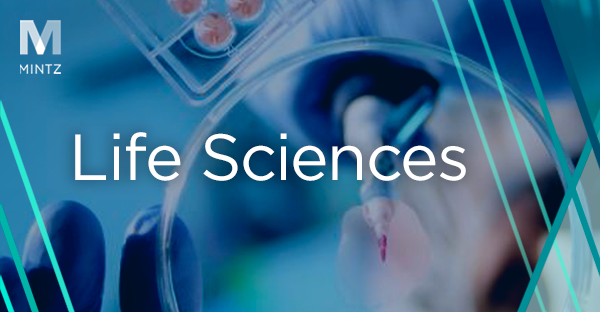
Life Sciences
Viewpoints
Filter by:
FDA’s Digital Health High Notes from 2022
February 13, 2023 | Blog | By Benjamin Zegarelli
There has been a lot of discussion of the Food and Drug Omnibus Reform Act of 2022 (FDORA), which was enacted on December 29, 2022 as part of the larger Consolidated Appropriations Act for 2023, but we should also take a moment to review last year’s actions and policy updates on digital health from the Food and Drug Administration (FDA). The year 2022 marked the conclusion of the five-year Software Precertification Pilot Program and the release of the final Clinical Decision Support Software guidance, among other things (both described below); however, major digital health policy updates and announcements were few and far between. In this post, we summarize the agency’s key actions in the digital health space in 2022.
Mintz Leads For CXLO In $32 Million Series A Fundraising
September 30, 2022
Mintz represented CXL Ophthalmics (CXLO), a clinical-stage company developing a minimally-invasive treatment for keratoconus, in a $32 million Series A round of fundraising.
FDA Is Accepting EUA Requests for Monkeypox Tests, But Time is of the Essence
September 28, 2022 | Blog | By Benjamin Zegarelli, Joanne Hawana
The Food and Drug Administration (FDA) issued a guidance on development and emergency use authorization of diagnostic and serological tests for the monkeypox virus following the Secretary of the Department of Health and Human Service’s declaration of a public health emergency under Section 564 of the Food, Drug and Cosmetic Act on August 9, 2022. Subsequently, the Secretary declared on September 7 that in vitro diagnostics for monkeypox were needed to respond to the public health emergency, and the FDA released its guidance on the same day. The monkeypox test guidance describes the agency’s general expectations and approach for test development and validation, as well as the EUA request process.
FDA’s Review of Pulse Oximeter Performance Continues a Trend in Addressing Biases in Digital Health Technologies
July 12, 2022 | Blog | By Benjamin Zegarelli
The U.S. Food and Drug Administration (FDA) will schedule a public meeting of the Medical Devices Advisory Committee later this year to discuss study results, real-world data, and other evidence concerning the accuracy and performance of pulse oximeters. The planned meeting is consistent with the agency’s recent efforts to evaluate the need for and options to address transparency and diversity in the design and development of artificial intelligence/machine learning (AI/ML) based software devices (see our post covering FDA’s Transparency of AI/ML Enabled Medical Devices Workshop) and in clinical trial design. It is unclear whether or how the outcome of the planned meeting on pulse oximeters will affect prescription and over-the-counter (OTC) pulse oximeters currently on the market, but it is possible that the meeting could lead FDA to impose new testing or labeling requirements for pulse oximeters, and perhaps even other devices that use light-based sensors to evaluate certain biometrics.
A Between The Biotech Waves Conversation With William Hicks
June 10, 2022 | Podcast
Bill Hicks was a guest on Between the Biotech Waves with Nessan Bermingham.
Summer 2022 Is Here – Do You Know How the FDA User Fee Legislation Is Going?
June 2, 2022 | Blog | By Joanne Hawana
Anyone who has spent any time around health care policymaking circles in Washington, D.C. has heard about the intense five-year cycle Congress goes through in order to reauthorize the biggest user fee programs at the Food and Drug Administration (FDA). Mintz previously published this wonderful explanation of the process complete with an estimated timeline for how this year’s reauthorization was likely to go. As a reminder, the current authorization for FDA’s various human product user fee programs – with the exception of the over-the-counter drug program that was freshly created in 2020 – will expire on September 30, 2022 with the end of the federal government’s fiscal year, unless they are renewed by Congress before that time.
FDA Cracks Down on Unauthorized and Counterfeit COVID-19 Diagnostic Tests
May 9, 2022 | Blog | By Benjamin Zegarelli
As the COVID-19 public health emergency drags into its third year, we continue to keep track of efforts by the Food and Drug Administration (FDA) to combat fraud in the form of fake cures, counterfeit diagnostic tests, and other products claiming to prevent, treat, or detect infection by SARS-CoV-2 that are marketed without required FDA authorization. Our previous posts provided updates on joint and separate efforts by FDA and the U.S. Federal Trade Commission (FTC) throughout the pandemic to detect and eliminate these illegal products. In this post, we focus on FDA’s recent enforcement activities concerning COVID-19 diagnostic tests and the agency’s increasingly aggressive pursuit of entities offering counterfeit or unauthorized tests.
Financing Options for Life Sciences Companies in 2022
March 21, 2022 | Blog
Public and private life science companies have multiple options available for capital-raising. Here are a few to be considered.
Minimizing Stockholder Litigation Risks
February 18, 2022 | Blog
In 2021, approximately on quarter of all federal securities fraud class action lawsuits filed nationwide were against life sciences companies and their officers and directors. These considerations are for directors and officers of life sciences companies looking to manage disclosures and mitigate risk before a suit ever gets filed.
Benefits of and Best Practices for Protecting Artificial Intelligence and Machine Learning Inventions as Trade Secrets
February 10, 2022 | Blog | By Marguerite McConihe, Meena Seralathan
Prior Daubert Orders and Discovery Lessons Out of N.D. Cal.
February 4, 2022 | Blog | By Peter Snell, Robert Sweeney
A recent order from the Northern District of California in Edwards Lifesciences Corp. v. Meril Life Sciences Pvt. Ltd., No. 19-cv-06593 (Jan. 27, 2022) (“Edwards”), provides guidance regarding the ability (or inability) to use a prior Daubert ruling to discredit an expert witness at trial when such a ruling arose within the context of a different case. In addition, the order highlights a pitfall that can arise when an opposing party produces deficient damages-related discovery but is not pressed to supplement its discovery through a motion to compel.
Written Description Requirement Challenges: Federal Circuit Decision Sheds Light on How Expert Testimony Can Help
January 21, 2022 | Blog | By Brad M Scheller, Meena Seralathan
Life Sciences CEO Interview: Joe Payne, President and CEO of Arcturus Therapeutics
November 1, 2021 | Blog
Coverage of FDA’s AI/ML Medical Devices Workshop - Part 3: A Summary of the Panel Discussions
October 20, 2021 | Blog | By Lara Compton, Benjamin Zegarelli
Coverage of FDA’s AI/ML Medical Devices Workshop - Part 2: FDA’s Recent Digital Health Initiatives
October 12, 2021 | Blog | By Benjamin Zegarelli, Lara Compton
Coverage of FDA’s AI/ML Medical Devices Workshop - Part 1: The History of FDA Software Regulation
October 4, 2021 | Blog | By Benjamin Zegarelli, Lara Compton
When It Isn’t Better Late Than Never: ALJ Reins in on Redesigns First Disclosed in the Last Week of Fact Discovery
September 21, 2021 | Blog | By Michael Renaud, Adam Rizk, Matthew Karambelas, Tianyi Tan
N.D. Ill. Finds that a Foreign Parent Corp. May be Sued Under BPCIA Without the U.S. Subsidiary that Signed and Filed aBLA
September 21, 2021 | Blog | By Thomas Wintner, Adam Samansky, Joe Rutkowski
Life Sciences Newsletter — September 2021
September 1, 2021 | Article | By Adam Lenain, William Whelan, Jonathan L. Kravetz, Terri Shieh-Newton
PTAB statistics show interesting trends for Orange Book and biologic patents in AIA proceedings
August 24, 2021 | Blog | By Peter Cuomo, Joe Rutkowski, Nana Liu
Explore Other Viewpoints:
- Data Centers & Digital Infrastructure
- AI: The Washington Report
- Antitrust
- Appellate
- Arbitration, Mediation & Alternate Dispute Resolution
- Artificial Intelligence
- Awards
- Bankruptcy & Restructuring
- California Land Use
- Cannabis
- Class Action
- Complex Commercial Litigation
- Construction
- Consumer Product Safety
- Corporate Governance (ESG)
- Cross-Border Asset Recovery
- DEI Legal Developments
- Debt Financing
- Direct Investing (M&A)
- Diversity
- EB-5 Financing
- Education & Nonprofits
- Employment
- EnforceMintz
- Environmental (ESG)
- Environmental Enforcement Defense
- Environmental Law
- Environmental, Social, and Corporate Governance (ESG)
- FDA Regulatory
- False Claims Act
- Federal Circuit Appeals
- Financial Institution Litigation
- Government Law
- Growth Equity
- Health Care
- Health Care Compliance, Fraud and Abuse, & Regulatory Counseling
- Health Care Enforcement & Investigations
- Health Care Transactions
- Health Information Privacy & Security
- IP Due Diligence
- IPRs & Other Post Grant Proceedings
- Immigration
- Impacts of a New US Administration
- Insolvency & Creditor Rights Litigation
- Institutional Investor Class Action Recovery
- Insurance & Financial Services
- Insurance Consulting & Risk Management
- Insurance and Reinsurance Problem-Solving & Dispute Resolution
- Intellectual Property
- Investment Funds
- Israel
- Licensing & Technology Transactions
- Life Sciences
- Litigation & Investigations
- M&A Litigation
- ML Strategies
- Medicare, Medicaid and Commercial Coverage & Reimbursement
- Mergers & Acquisitions
- Patent Litigation
- Patent Prosecution & Strategic Counseling
- Pharmacy Benefits and PBM Contracting
- Portfolio Companies
- Privacy & Cybersecurity
- Private Client
- Private Equity
- Pro Bono
- Probate & Fiduciary Litigation
- Products Liability & Complex Tort
- Projects & Infrastructure
- Public Finance
- Real Estate Litigation
- Real Estate Transactions
- Real Estate, Construction & Infrastructure
- Retail & Consumer Products
- Securities & Capital Markets
- Securities Litigation
- Social (ESG)
- Special Purpose Acquisition Company (SPACs)
- Sports & Entertainment
- State Attorneys General
- Strategic IP Monetization & Licensing
- Sustainable Energy & Infrastructure
- Tax
- Technology
- Technology, Communications & Media
- Technology, Communications & Media Litigation
- Trade Secrets
- Trademark & Copyright
- Trademark Litigation
- Unified Patent Court (UPC)
- Value-Based Care
- Venture Capital & Emerging Companies
- White Collar Defense & Government Investigations
- Women's Health and Technology






